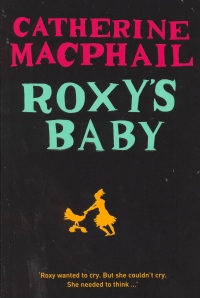| ________________
CM . . .
. Volume XII Number 7 . . . .November 25, 2005
excerpt:
Roxy's Baby is a thriller and a cautionary tale for teenage girls. Fourteen-year-old Roxy, shattered by her father's death, cannot accept her mother's remarriage to a nice-enough fellow. She stays out late with bad friends. When she has sex on a dare and gets pregnant, she decides to run away to London from her home in Scotland. Since she is not getting along with her family and is sure they will put her out when they learn the news, she heads for a refuge for runaway girls which was the subject of a magazine article. The woman running the refuge tells Roxy that she must turn her in to the police because she is underage. Before she does so, a girl at the home approaches Roxy, guesses rightly that she is pregnant, and tells her of a couple who help young pregnant women. Thus Rosy ends up in an elegant, isolated country mansion, cut off from communications with the outside world. Why? The seemingly kind Dyces claim that the news might upset the young expectant mothers. Also, some girls, like Roxy, are underage; the Dyces must keep from the police their efforts to "help" them. The girls are confined to the grounds. Many of the girls are from immigrant backgrounds. One, Sula, has a cobra tattoo on her arm. Roxy, naturally rebellious, asks questions. She learns that the girls disappear from the house once they go into labour. Anne Marie, who loves the Dyces, says that having newborns in the house upsets girls who had chosen adoption. "So now once you have your baby, you're both whisked away to another house where all the mothers and babies go." Roxy slips away through an open gate, finds a parked car and listens to the news on the radio. The unidentified body of a young girl was washed up in the Thames two weeks earlier. Subsequently, Roxy gets hold of a newspaper and learns that the dead girl had just had a baby and had a cobra tattoo on her arm. Dr. Mengele's experiments, baby selling, even the old film, Rosemary's Baby, involving Satan worship, spring to her mind. Roxy's Baby comes to a climax with a fire that frees the young women from the Dyces' clutches. Only as an anti-climax do we learn that the babies were indeed being sold for organ harvesting. Some years ago, I watched a TV documentary about rich people buying organs harvested from people in third world countries. Infants were not mentioned. Instead, starving peasants were approached with a proposition like, "Sell me one of your kidneys." It goes without saying that this exploitation is disgusting, but, that being acknowledged, I'm left wondering what the demand is for babies' organs. Certainly infants' hearts and livers could be transplanted to sick babies. One hears of corneal transplants. Is the writer alluding indirectly to stem cell research? Author Catherine Macphail doesn't follow through with sufficient information, nor does she tell us how widespread this "harvesting" is. Maybe she considers it too grisly a subject to pursue in depth, but she's the one who introduced the topic. Macphail says she got the idea for the novel from an interview on British radio with a pregnant teenage immigrant who had fallen into the hands of organ harvesters. She adds: "Part of me felt guilty about writing it as a thriller." She should feel guilty. Reading Roxy's Baby could add to the anxieties of pregnant women who need the kindness of strangers. As a friend of a social worker in a home for unwed mothers and also as a friend of some excellent foster parents of teens, I think this book will stir up suspicion of legitimate people in caring professions. Possibly the novel could be beneficial in scaring girls into abstinence or using birth control. Also, Roxy's Baby may influence young pregnant girls to seek family help—fine, if the help is there. On the whole, however, the lack of solid information on organ harvesting makes it a sensational and exploitative book. Recommended with reservations. Ruth Latta's young adult mystery, The Secret of White Birch Road, was published in the summer of 2005 by Baico Publishing, Gatineau, PQ.
To comment
on this title or this review, send mail to cm@umanitoba.ca.
Copyright © the Manitoba Library Association. Reproduction for personal
use is permitted only if this copyright notice is maintained. Any
other reproduction is prohibited without permission.
NEXT REVIEW |
TABLE OF CONTENTS FOR THIS ISSUE
- November 25, 2005.
AUTHORS |
TITLES |
MEDIA REVIEWS |
PROFILES |
BACK ISSUES |
SEARCH |
CMARCHIVE |
HOME |
